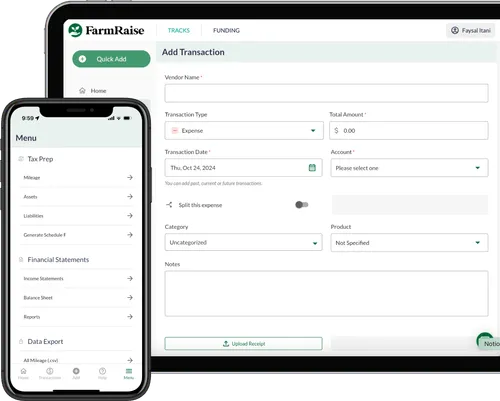July 8, 2022
Get Cash for Your Farm With a CSA Plan
"Just as a Social Security number is a unique identifier for a person, a farm serial number (FSN) is a unique identifier for parcels of land”
- Kentucky Center for Agriculture and Rural Development (KCARD)

What top of mind for farm profitability?
Community Supported Agriculture (CSA)
It's a production and marketing model where customers purchase shares of a farm’s harvest to make sure they receive farm-raised products throughout the growing season.
How are CSAs done?
Think of it as a pie. CSA members help you purchase the ingredients. You do the baking and when the pie's done, they get a slice proportional to the amount they contributed.
In technical terms...
CSA member shares act as an investment in the risk and reward of production. Purchasing a share is generally done with a one-time annual payment or through incremental installments.
Sounds helpful.
It can be! CSA shares can offer you upfront funds during the start of the growing season and also helps free you from time-demanding tasks like marketing your products. CSAs can offer a variety of vegetables, fruits, herbs, meats, eggs, dairy, cut flowers and value-added products.
Nice! Should I try it?
CSAs can be profitable for you. It's also beneficial for customers looking to better understand and invest in where their food comes from and who works hard to produce it (that's you!). Like all new farm ventures, getting your CSA off the ground takes planning and careful consideration.
This week's Farm Prosperity Checklist will help you decide if CSAs are right for your farm and give you ideas for how to start.

This Week's Prosperity Checklist: Starting a CSA
1. Recruit potential CSA members
- Start networking and prospecting in your circles: Friends, family, neighbors, colleagues, fellow farmers, etc.
- Then gauge interest from your local businesses and organizations: Churches, community action organizations, health food stores, fitness centers, schools, civic organizations, etc.
2. Craft a business plan and budget
Construct a realistic and detailed cost breakdown of all likely expenses. It'll help you determine your membership share prices. Your expenses should include:
- Operating expenses (seeds, water, fuel)
- Equipment
- Labor
- Delivery or hospitality expenses (see the next step for details)
3. Establish a delivery system
Talk with your potential customers to come up with the best delivery channel, pick up method and delivery timeframe. You've got options here:
- On-farm pick-up
- Central distribution site
- Farmers’ market
- Home delivery
- Bulk distribution to business or institute, etc.
4. Determine share price
Most CSAs offer full shares and half shares. The national average for an annual, full share is $400-700. You might even consider offering discounted membership shares in exchange for hours or farm-work.
For more info: The NC State Extension offers a detailed CSA resource guide for farmers. The USDA-National Agricultural Library also offers a comprehensive list of resources related to structuring a CSA business.
CSAs All Day! An Example of a CSA Success Story
So how can you get financial help starting a CSA?
Sustainable Agriculture Research and Education (SARE) is a competitive grant program that supports research and education projects which bring new ideas to farms and ranches around the country.
Conducting research projects which examine the viability of a CSA in a given community could be considered a "local and regional food systems" project.
Sundance Acres LLC in New Carlisle, Indiana, used SARE funding to conduct a study which investigated interest and support for a CSA model. It also determined which marketing strategies would be most effective for creating a sustainable CSA business in their small community.You can search the SARE Grant Management System to peruse reports highlighting outcomes of SARE funded projects across the nation.
LEARN MORE ABOUT HOW TO APPLY FOR SARE

This week's survey results are in:
CSAmazing! Two-thirds of the FarmRaise community offers CSA shares and it seems all of you are finding it beneficial.
A huge shoutout and unsolicited plug for Three Rivers Community Farm in Elsah, Illinois. Their spring, summer and fall CSA shares are always filled with a variety of produce and are delivered extensively throughout the St. Louis Metropolitan area and surrounding rural communities. Hip hip hooray for their CSA!
Did you like this article? Get info like this delivered to your inbox before it's published here on FarmRaise.com by signing up for the Morning Briefing. 📧
